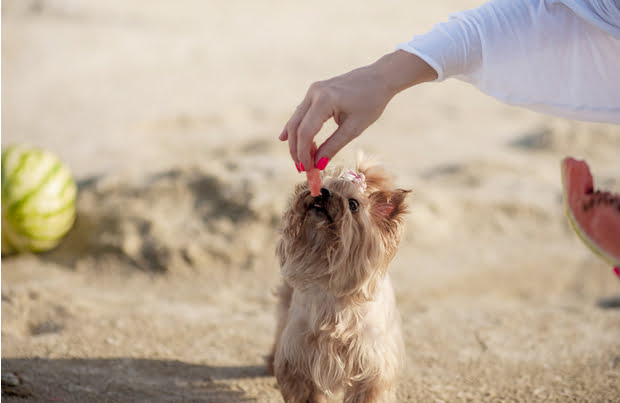
Watermelon is a staple of beach trips and BBQs, but it may not necessarily be the first plant-based snack people think to give their dogs. As it turns out, it’s actually the perfect summer treat.
Even better, since it’s tasty and healthy for dogs and humans alike, it’s a great snack to share.
Here’s what you need to know about the dos and don’ts of feeding your dog this favorite summer treat.
Health Benefits of Watermelon for Dogs
Watermelon contains both vitamin A and potassium, two nutrients that dogs need, says Susan Lauten, owner of Pet Nutrition Consulting in Knoxville, Tennessee.
With only approximately 46 calories per cup, watermelon is also fat free and low in sodium. Since watermelon is composed primarily of water (92 percent, in fact), it’s also a good source of hydration for dogs, she adds.
While watermelon is most often associated with summer when it’s at it’s peak, it is available year-round.
Is Watermelon Safe for Dogs?
Dog owners should take precautions when feeding their dogs watermelon, as there are two parts of the watermelon that are strictly off limits: the seeds and the skin.
The black seeds from watermelons can cause intestinal obstructions in small dogs if swallowed, so they need to be removed first, says Lauten.
“Seeds tend to be less of a problem for big dogs, whose larger intestines allow the seeds to pass through more easily,” she says.
Still, the risk can be eliminated for all dogs by buying seedless watermelon, making for an easy alternative to removing the seeds by hand.
When it comes to the rind of the watermelon, dogs can nibble on that portion, but they should not eat the green skin, Lauten says, because they are unable to digest it.
Preparing Watermelon for Dogs
In its simplest form, fresh watermelon cut up into small cubes makes a healthy snack or a special reward during training, Lauten says.
If you’d like to get a bit more creative, watermelon can be frozen in ice cube trays for a cool treat or combined with a few simple ingredients to make a dog-friendly watermelon sorbet.
As is the case with anything concerning your pet, it’s always a good idea to check with your veterinarian before introducing new foods into your dog’s diet.








